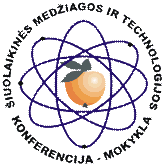 |
|
 |
Tentative list of presentations: Dr. Laurent Pizzagalli (Poitiers University, France), “Modeling of structure defects in covalent materials”. Dr. Artūras Vailionis (Geballe Laboratory for Advanced Materials, Stanford University, USA), “Advanced X-ray Diffraction: a Practical Approach to Microstructural Analysis of Low-Dimensional Structures”. Prof. Rimas Vaisnys (Yale University, USA), “Atoms, Bits, and (C) symbols”. Prof. Yury Kolobov (Belgorad State University, Russia), “Grain boundaries diffusion controlled process and mechanical properties of bulk nanostructured materials”. Prof. Juozas Vidas Grazulevicius (Department of Organic Technology, Kaunas University of Technology, Lithuania) “Organic electroactive materials for (opto)electronic devices”. Assoc. prof. Igor Zozoulenko (Solid State Electronics Department of Science and Technology (ITN) Linkoping University, Sweden), “Surface plasmons and their applications in electro-optical devices”. Prof. Michel Gruselle (Laboratoire de chimie des metaux de transitio Universite Pierre et Marie Curie France), “Enantioselective self-assembly of bimetallic oxalate-based networks“. Prof. Andrzej Klonkowski (Department of Chemical Technology Faculty of Chemistry University of Gdansk Poland), “Materials with semiconductor and noble metal nanostructures prepared by sol-gel procedure“. Prof. Aivaras Kareiva (Dept. of General and Inorganic Chemistry Vilnius University, Lithuania), “Sol-gel derived garnet structure compounds for electronic applications“. Prof. Eimutis Juzeliūnas (Institute of Chemistry, Vilnius, Lithuania), “Magnetron sputtered alloys – structure, electrochemistry and corrosion resistance”. Dr.Habil.Phys. Inta Muzikante et al (Institute of Solid State Physics, University of Latvia, Latvia), „Charge carriers injection and transport in organic solid state”. Dr.habil.phys. Donats Millers et al (Institute of Solid State Physics, University of Latvia, Latvia), “Luminescence - a tool for nanocrystal study”.
Duration of the oral presentation lecture: 45 or 90 minutes |